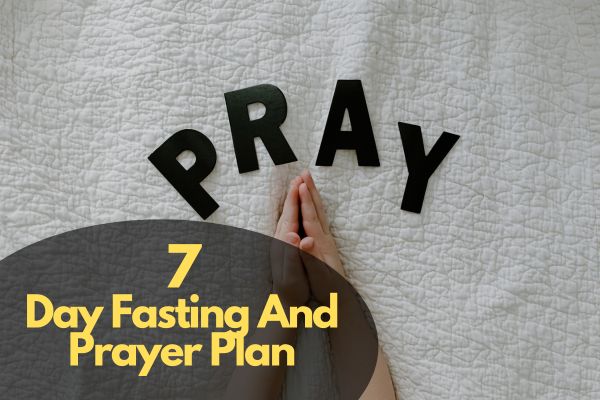Table of Contents Show
In what way are you feeling stalled on your spiritual path? You might be able to achieve a breakthrough in your life by fasting and praying.
Numerous Christians hold a special reverence for the spiritual practices of fasting and prayer, seeing them as a chance to surrender, draw nearer to God, and seek His guidance. As we step into this sacred realm, we initiate a transformative voyage where each day unfolds as a new page in our spiritual awakening, growth, and awareness.
This “7 Day Fasting and Prayer Plan” goes beyond a mere timetable; it’s an earnest invitation to dig profoundly within ourselves and embrace the deep impact of prayer and fasting, leading to a deeply fulfilling spiritual encounter.
7 Day Fasting And Prayer Plan
Starting a “7 day fasting and prayer plan” can be a life-changing event that strengthens your spiritual ties and promotes development. This all-inclusive manual will provide you with a well-structured, seven-day schedule to assist you in traveling this path with discipline, intention, and purpose.
-
Day 1: Establishing the Goal
Make a plan for the fast at the outset. Consider your spiritual goals, such as growing in your intimacy with God, asking for wisdom, or cultivating gratitude. Spend some time in prayer and meditation to make your objectives clear and to align your heart and mind with the purpose of the fast.
-
Day 2: Semi-Water Fast
Think about doing a water fast or a partial fast for the following two days. Drink only water when on a water fast; avoid solid meals at all. As an alternative, limit specific foods or meals while keeping your intake modest during a partial fast. Select a fasting method based on your physical capabilities and objectives.
-
Day 3: Get your body ready
It’s critical to get your body ready for the fast because going without food can be quite an adjustment for your body. In the days preceding the fast, make sure you eat meals high in nutrients and drink lots of water. Additionally, if you have any health issues that could be impacted by fasting, get medical advice.
-
Day 4: intermittent fasting
Make the switch to intermittent fasting on the fourth day. This entails restricting your eating to certain times of day, such as an eight-hour window. With this method, you can reap the benefits of fasting while still providing your body with nourishment for a set time.
-
Day 5–6: Meditation and introspection
During these two days, focus on introspection, reflection, and meditation. Allocate specific time for reflection, meditation, and prayer. Spend this time seeking clarity, making a connection with the Almighty, and listening for any insights or direction that may come to you.
-
Day 7: Expressing Thanks and Breaking the Fast
Break your fast carefully and gradually on the last day. Reintroducing regular meals should be done gradually, starting with light, easily digestible foods. Give thanks for the experience and the knowledge gained when you break your fast. Give thanksgiving prayers for the spiritual development and connection you had as you consider the realizations you obtained over the week.
During the 7 Day Plan
1. Maintain Hydration: Throughout the fast, sip on lots of water to keep your body hydrated and aid in the cleansing process.
2. Pray consistently: Set aside time every day for introspective prayer, intention-setting, requesting direction, and developing a closer relationship with God.
3. Journal: Keep a notebook in which you can write down your feelings, ideas, and any insights or experiences you have while fasting. You can track your development, obtain clarity, and consider your spiritual journey with the aid of this practice.
4. Engage with a spiritual group: Spiritual leaders can offer guidance and encouragement. During your fasting and prayer journey, connect with like-minded people.
Scriptures To Read During The 7 Day Fasting And Prayer
Matthew 6:16–18: talks about the significance of fasting covertly and the benefits that result from fasting for the correct reasons.
Isaiah 58:6–8: This chapter instructs us on the type of fasting that is acceptable to God and the benefits associated with it.
Psalm 63:1–5: This psalm conveys the psalmist’s intense yearning for God and his intention to pursue God via prayer and fasting.
Mark 9:29: This scripture emphasizes how effective fasting and prayer are in breaking spiritual barriers.
Ezra 8:21–23: This chapter portrays a period of communal fasting and prayer for protection while traveling, which can encourage us to offer up prayers for protection and direction when we fast ourselves.
Joel 2:12–13: This chapter exhorts us to turn back to God in fasting, prayer, and grief, and to put our faith in His mercy and compassion.
Note: The text that most resonates with you and helps you get closer to God is the ideal one to read while fasting. As you read the Bible, pray for wisdom and direction, and open yourself up to receiving messages from the Holy Spirit through His written word.
Benefits of Fasting and Prayer
Fasting and prayer have a lot of benefits and these benefits cover every area of our lives. Some of the benefits of fasting and prayer are:
- Fasting gives us direction and clarity.
- Fasting serves as an opportunity to ask God for direction and guidance in our lives.
- Fasting improves our prayer lives.
- Breaking spiritual barriers is facilitated by fasting.
- Fasting allows us to humble ourselves before God and ask for His assistance in conquering our sinful and weak areas.
Conclusion
Starting a 7 day fasting and prayer plan is a potent method to strengthen your relationship with God, foster personal development, and ask for heavenly guidance. You may approach the journey with intention, dedication, and awareness if you adhere to this detailed strategy.
Remember that fasting is more about substitution than it is about abstinence: substituting a concentrated period of prayer and Bible reading for everyday activity.








